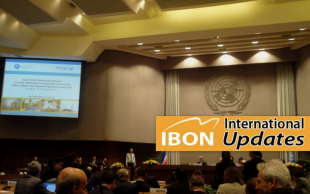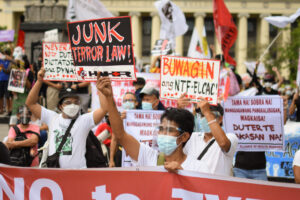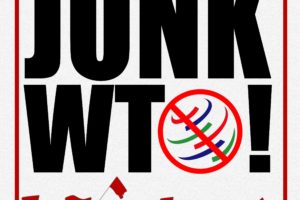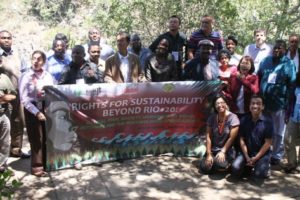IBON International Update #1 from APMD Bangkok
[[{“type”:”media”,”view_mode”:”media_large”,”fid”:”24″,”attributes”:{“alt”:””,”class”:”media-image”,”height”:”194″,”style”:”width: 310px; height: 194px; float: right;”,”typeof”:”foaf:Image”,”width”:”310″}}]]
Reportage from the Asia-Pacific Ministerial Dialogue in Bangkok
Civil society has engaged Asia & Pacific governments in the Asia Pacific Ministerial Dialogue (APMD) to commit to real transformative chang
e. Yet propositions that strongly articulate the need for equity have been stubbornly opposed by the United States and other advanced countries who are not even part of the region but members of UN Economic and Social Commission for Asia and the Pacific (ESCAP). The US, United Kingdom, France and other advanced countries were part of the core group that led to the formation of ESCAP as part of post-war reconstruction under the Marshall Plan.
Paul Quintos of the Campaign for People's Goals pointed out that this obsctructionism is principally to balme for the uninspired outcome of the Ministerial, which is full of vague acknowledgements of the need to help developing countries as well as lip service to poverty eradication and sustainable development. Neth Dano of the ETC Group – Action Group on Erosion, Technology and Concentration added that this has resulted in a neutered draft, as developed countries refuse to recognize common but differentiated responsibilities (CBDR) and other Rio principles by blocking any reference to it in the Ministerial draft. Chee Yoke Ling of Third World Network (TWN) stressed that it is therefore important for civil society to assert and attempt to win over developing countries in the region as our allies, fight for formerly agreed-upon principles and isolate those that do not rightfully belong in the region.
Inequality and injustice are issues of urgent concern for the people of the Asia Pacific region. Robust economic growth is overhyped amidst worsening inequality, poverty, hunger and unemployment. Ministerial delegates willingly admit that growing inequality has undermined attained growth. In line with this, the dominant underlying message given by governments and regional institutions has focused on the importance of thriving economies, sustaining economic growth and making economies more inclusive to address development challenges of poverty and inequality in the region. ADB highlighted the importance of forging new partnerships, with particular emphasis on the private sector, in meeting region’s development needs. Meanwhile, the Secretary General of ASEAN explained that regional integration through the ASEAN Community (economic, political, and socio-cultural) blueprints are crucial in charting the path towards regional sustainable development.
Some Least Developed Countries (LDCs) have raised doubts about the effectiveness of economic growth as a development indicator. Bhutan challenged the use of gross domestic product (GDP) as a key development indicator and introduced instead the Gross Happiness Index. Bangladesh questioned the practice of treating economic growth as an end in itself, rather than a mere instrument towards achieving an objective.
India stressed the crucial task of addressing inequality of consumption of global resources and unsustainable consumption and production patterns in order to achieve sustainability. TWN, which was also a panel member in one of the roundtables, stressed that the principle of C
BDR is more important today as inequality becomes more and more pronounced; and that poverty eradication must go hand in hand with redistribution of wealth. Unfair rules in international trade, finance, Intellectual Property Rights (IPR) and investments impede efforts at promoting sustainable development in the South. National policies are shaped by corporate interests that give priority to foreign capital over domestic capital. Meanwhile, trade regimes pursuing so-called development agendas only end up pushing for more liberalization that further shrinks developing countries’ policy space. Trade agreements have become so secretive that signing on to a secrecy agreement is now one of the preconditions for entering an economic partnership agreement. These are the real and systemic economic issues in trade and finance that are crucial to be tackled but were absent from the HLP report.
Nurgul Djanaeva from the NGO Major Groups urged governments to move away from market-driven economic approach to development towards a new development framework called development justice. Development justice, she explained, should be framed by five foundational shifts: redistributive justice, economic justice, environmental justice, social justice, and accountability to peoples. It should be anchored on the need to reshape development so that it does not benefit only the few elites and on the recognition that eradicating extreme poverty necessarily entails eradicating extreme wealth.
In the afternoon, civil society met with Ambassador Macharia Kamau of Keyna, Co-Chair of Open Working Group (OWG) on Sustainable Development Goals (SDGs). It was a frank and open dialogue where CSOs expressed some dissatisfaction with partial and selective summaries of the deliberations in the OWG meetings that omit important inputs provided by CSOs, developing countries and other stakeholders. The report also showed bias for private sector positions. CSOs were both offended and indignant at the Co-Chair’s response which cavalierly dismissed
concerns of civil society. The Co-Chair claims it is civil society’s problem if their messages were not put across because their representatives in New York did not bring their messages effectively so the OWG should not be held accountable.
Inequity both within and between countries in the region is as stark as ever. Eni Lestari of the International Migrants Alliance (IMA) ended the session with a strong message to regional leaders to seize the rare opportunity that the post-2015 development agenda presents. She shared her story as a migrant domestic worker in Hong Kong to give governments a sense of what the market-driven approach to development is doing to billions of their constituents. Development and addressing inequality, she went on, has become the buzzword among civil society groups, governments, and institutions in the region. While this reflects a greater level of awareness and could be seen as a welcome development, it is equally a cause for alarm as new discourses on tackling inequality and “leaving no one behind” have come to the fore. Civil society should now take up the challenge of exposing and opposing new permutations of what are really just the same tired neoliberal policies that have brought forth inequality and exacerbated the well-being of people from the grassroots. Ms. Lestari ended her statement urging the region’s leaders to be brave and honor the constituents of our shared world denied of rights by committing to development justice. ###
_____________________________________________________________________
Notes to editors:
* 92 Civil society organizations from 21 countries across the region came together on August 23-24, 2013 for the Asia Pacific regional CSO consultation for a just and transformative development agenda. The outcome document, the Civil Society Bangkok Declaration: From Inclusive to Just Development is attached here. http://www.unescap.org/Sustainable-Development/forums/Post-2015CivilSocietyConsultation/index.asp
* The Asia-Pacific CSO Consultation aimed to contribute to the discussions in the Ministerial Dialogue: From the Millennium Development Goals to the UN Development Agenda beyond 2015. http://apmd2013.unescap.org/
For more information, please contact:
Paul Quintos, pquintos@iboninternational.org, +63 9175 490 412 (international)



